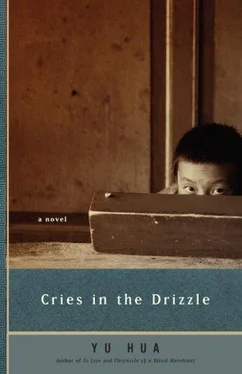In his final years my grandfather's plight was like that of a rickety old chair that is abandoned and can only wait quietly for the advent of the fire that will consume it. On the day Granddad came to grief my brother Sun Guangping had been given a satchel, an accessory that, owing to the fact he was older than me, he received well before I did. That moment still glimmers in my childhood memory. Late one afternoon, on the eve of the start of the school year, my father Sun Kwangtsai sat on the doorsill, puffed up with unjustified pride, loudly instructing my older brother what to do if the kids in town got into an argument with him: “If there's just one of them, hit him; if there's two, scoot back home.”
Sun Guangping, then eight years old, gazed at Sun Kwangtsai with a look of mindless awe; it was during these years that he most idolized his father. His deferential expression inspired my father to patiently explain the reasoning behind this injunction, unconscious of what nonsense he was talking.
For a clodhopper, my father was very smart, and quick to pick up whatever fashion was in vogue. The first time my brother headed off for school with his satchel on his back, Sun Kwangtsai stood at the entrance to the village and issued a final reminder. It was comical to see a grown man like him imitate the tone of a bad guy in a movie. “Password?” he barked out.
My older brother had a natural gift for putting things in a nutshell. When he turned around to deliver his response, he did not repeat his fathers fussy and complicated instructions but called simply “Beat one, flee two.”
In the midst of that gleeful exchange my aging grandfather slipped past silently, holding a length of cord: he was going up the hill to collect firewood. Seen from behind, he looked so tall and strong. I was sitting on the ground, and his forceful steps sprinkled dust over my face, blurring the jealousy I felt toward my brother and the unthinking excitement of the moment.
My grandfather's misadventure was intertwined with my big brother's jubilation. At that stage, more than twenty years ago, my younger brother and I were still happy just to forage for snails at the edge of the pond. But Sun Guangping, on his first day back from school, was all set to show off what he had learned. I'll never forget how he swaggered home with his satchel over his shoulder, then swung the satchel around so that it hung over his chest and put his hands behind his back. The latter gesture clearly was designed as an imitation of his teacher. He sat down next to the pond and pulled his textbook out, first letting the sunlight catch it, then reading it with great concentration. My little brother and I watched dumbfounded, the way two hungry dogs, their stomachs rumbling, might watch a bone flying through the air.
It was at this precise moment that Sun Kwangtsai came lumbering up, with an ashen Sun Youyuan on his back. My father was fuming. He set Sun Youyuan down inside on his bed, and as soon as he came out of the house he started muttering, “It's just what I was afraid of, that somebody would get sick. Now we're really screwed! One more mouth to feed and one less pair of hands at work — that's twice we lose out.”
After taking that tumble on the hill my grandfather was laid up in bed for a whole month, and though later he was able to get up and walk about, his back was so stiff that full movement was beyond him. Having lost the capacity to engage in labor, he would greet the villagers with a smile even more timid than the one he wore when my grandmother died. I can still picture the tremulous look on his face as he told them, “I can't bend down.”
One could hear self-recrimination in his voice, as well as an eagerness to justify himself. His fate was forever altered by this sudden handicap, and he began a life of dependency. In the few months leading up to my departure from Southgate, the old man, once so hale and hearty, rapidly grew sallow and emaciated, as though a makeup department had been working on him. It was clear that he had become an encumbrance, and thus was inaugurated the arrangement whereby his sons took turns looking after him, and I finally learned that I had an uncle. After a full month at our house, Granddad would set off along the dirt track into town. He needed to take a boat from there, I believe, to reach the place where my uncle lived. A month later, right around dusk, his figure would shamble into sight again in the distance, on that same road.
At such moments, my big brother and I would race exuberantly toward him. Our little brother could only stand at the edge of the village and watch us as we ran, a smile of vicarious excitement on his face. Sun Youyuan's eyes would brim with tears, and his hands would tremble as he ruffled our hair. In reality, our mad dash was inspired by sibling rivalry, not by any great delight at Granddad's return. The umbrella in his hand and the bundle on his back were what triggered our enthusiasm: whoever was first to grab the umbrella was the undisputed champion. Once, I remember, my brother seized the bundle as well as the umbrella, and then marched along on Granddad's right, proud as a peacock. I, on the other hand, was heartbroken to be completely empty-handed. On the short walk home I kept complaining to Granddad about how unreasonable my brother was. “He's got the bundle too!” I sobbed, “He took the umbrella, and then he took the bundle!”
Granddad did not correct this injustice, as I had hoped. His misunderstanding of our motives brought tears to his eyes, and I can still remember how he wiped them away with the back of his hand. My little brother, then four, was always on the lookout for ways of turning things to his advantage, and seeing Granddad so tearful he ran home as fast as he could, shrilly announcing to our parents: “Granddad's crying.” Though he, like me, came back empty-handed, he had found something to make up for it.
Given my tender age before I left home, I could not possibly feel the extent of the humiliation Granddad suffered. But now that I think about it, my father was always in a foul mood during the month that Granddad was with us. In our cramped little house he would often howl as loud as a winter gale. If he pointed at Sun Youyuan and cursed him by name, then I would be in no doubt that Granddad was bearing the brunt of his rage, but at other times I would watch my father warily in case he was suddenly to aim a kick at me. When I was young my father was an unpredictable fellow.
During his time at our house my grandfather was so self-effacing that he practically disappeared. He would sit for a long time in an inconspicuous corner, silently idling away what little life he had left. But when meals were served he would appear on the scene as quick as lightning, often startling us three boys. My little brother then had an opportunity to show off, putting his hand to his chest and looking agitated, so as to underscore what a fright he'd been given.
Examples of Granddad's spinelessness remain etched on my mind. On one occasion when Sun Guangming went looking for him, my little brother — still unsteady on his feet — fell down and started wailing. Not only that — he started cursing too, as if he had somehow been tripped. Not yet able to enunciate very well, he did his best to swear with great conviction, though it all sounded like a puppy's yapping to me. Granddad, however, was so anxious that his face went pale, fearful that Sun Guangming would carry on crying right until my father came back from the fields at the end of the day, and knowing that Sun Kwangtsai would never pass up an opportunity to fly into a rage. One could see in Sun You-yuan's eyes a dread that disaster was about to strike.
After his accident Sun Youyuan seldom mentioned our grandmother, talk of whom made us uncomfortable. Instead he became accustomed to recalling for himself the days that he spent with her. He, after all, was the only member of the family who would have been able to savor the memories of their lives together.
Читать дальше












